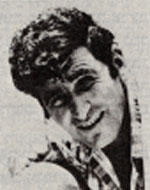Gad (Gadi), son of Frida and Moshe, was born on August 20, 1940, in Kibbutz Ramat Rachel. He studied at the Gordon Elementary School in Holon, and then continued his studies at the Kugel High School in Holon and the Kaduri Agricultural School. As a child, Gadi’s family moved from Ramat Rachel to Jerusalem and then moved to Holon. He was a neat boy, but as a student he was not very good, for he did not like to study. After spending a year in a high school in Holon, he got what he wanted and was transferred to an agricultural school, where he learned only the bare minimum before exams. He liked to argue for hours on subjects of various subjects. On the other hand, he excelled in practical work, invested all his energy in the barn, specialized in everything related to sheep and had no other professional knowledge in this field. After that he worked in the field and started riding horses. During the elementary school days, he was an active member of the United Movement. Gadi (known as “Shomach”) was able to develop personal relationships with different people, and during his days at the Kadouri School he had many friends among the students, among the teachers and counselors, and even among the residents of the neighboring Arab village. In the last year of his studies at Kadouri, a nucleus of the school was formed, which was about to complete Kibbutz Nativ-Halev, and that was how Gadi and the kibbutz got together, and he began to visit him frequently, about half a year before he was actually raised there. Gadi was a cooking enthusiast and knew how to make special dishes, he enjoyed the garden next to his house and liked to pat it, and he loved to sing, drink and go wild, and his enthusiasm for Russian songs was a good thing. He was always very optimistic and believed in a person, there was nothing impossible about him. He was very honest, he did his job with all his responsibility and devotion, and he was very honest, And he would work long hours willingly and gladly … He believed that when a worker had to do the maximum, even in difficult conditions, he was always very comfortable working with him, always with time and always with a stoic calm and even speaking slowly. , Even though he was meticulous in matters of order and discipline, and especially in his service in the army. From childhood he had been very attached to his younger brother and they enjoyed talking to each other and spending time together. Gadi loved children and later, when his daughter was born, he became a different person; Nothing mattered to him like his daughter, and he did not stop talking about her tenderly and lovingly. Gadi was drafted into the IDF in mid-October 1959, and as a member of a nucleus he was posted to the Nahal Brigade. After completing Shalav in Netiv HaLamed Hah and after basic training, he took part in a course for commanders, a course on anti-tank weapons and a course for infantry officers. After completing his officer’s course, he was assigned to the infantry brigade, underwent a parachuting course and was assigned as a platoon commander in the Nahal Brigade, where he was considered a good, diligent and dedicated officer. After completing his regular service, Gadi was promoted to lieutenant colonel and assigned to reserve duty in the infantry regiment, and after a year and a half volunteered for regular army service and was appointed deputy company commander in that unit. After a while he was assigned the command of the Kerem Shalom outpost and later was appointed commander of a Nahal company. After undergoing an educational training for officers and a course for company commanders, Gadi was appointed commander of the Tzur Natan outpost and promoted to the rank of captain. He took settlement and security very seriously, but he did not consider the formal aspect of the army and the paperwork did not find his hands and feet. After being discharged from the career army, he was transferred to the military service and was appointed deputy commander of the Har Tuv Brigade, and was later appointed commander of the battalion, and was considered an excellent officer, a responsible and dedicated commander, efficient in his work, In 1966 he returned to the kibbutz and from 1970 he was recruited for two years to the secretariat of the Mahanot Ha’olim in Tel Aviv as a treasurer and a member of the organization. He worked in the secretariat and carried the movement’s activities on his shoulders, even though he did not aspire to this role. Gadi wanted to return to the infantry brigade, and in early 1973 he was appointed a senior lieutenant commander in the infantry regiment and was later appointed commander of the regiment, and according to his subordinates he was more a “father” than a commander and would settle disputes by means of explanation and persuasion. When the Yom Kippur War broke out, Gadi served as the commander of the “Oracle” stronghold on the banks of the Suez Canal, and he left the stronghold to manage them and fought courageously and bravely. On October 6, 1973, when he was observing enemy forces, he was hit by artillery shelling and killed. He was laid to rest in the military cemetery on Mount Herzl. He left behind a wife and daughter, parents and two brothers. After his fall, he was promoted to the rank of Major. His kibbutz published a pamphlet in his memory that included things about his character, written by his family and friends from the school, the kibbutz, the movement and the army.
